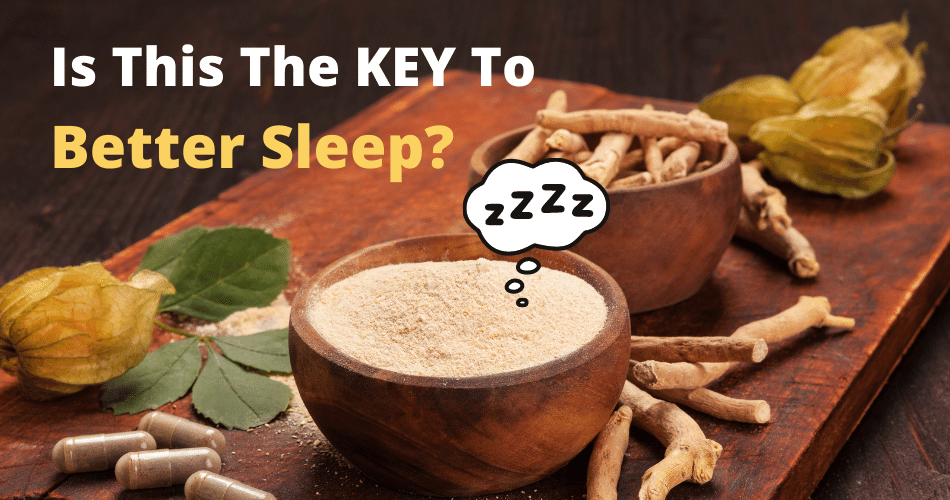
Getting deep, quality sleep every night is crucial for good health. Yet, around 30% worldwide report that they don’t usually get the seven hours of sleep recommended per night. This affects the endocrine, nervous, and cardiopulmonary systems, increases stress, worsens the body’s condition, and can even lead to some serious consequences. Not to mention, no one wants to wake up in the morning feeling like they’ve been out for a run instead of having a good night’s sleep. That’s how chronic stress starts. People try many different things in search of the best working solution to fight insomnia but often meet obstacles. Today, I will share with you that there is a powerful plant-based adaptogen that improves not only stress levels and benefits the body’s health but also significantly improves sleep. The benefits of Ashwagandha for sleep have been proven in many studies, and people who use it daily report that their sleep quality has improved. Now let’s see whether Ashwagandha can help you improve your sleep, how it works, and what other health benefits it has.
What is Ashwagandha?

Ashwagandha is known to come from India but can also be found in Africa and parts of the Middle East. It’s one of the most important herbs in Ayurveda, the alternative natural healing medicine. Ashwagandha is used in many other health practices, such as herbal medicine, and can be found in a variety of conditions, all of which are effective and safe. The Indian ginseng is an adaptogen – a plant proven to help the body cope with stress, improve sleep, reduce mental health conditions, and much more.
People have been using Ashwagandha for many years now, and thankfully, it’s proven that the herb helps boost one’s health in many ways, mainly improving strength. Even the name of the herb itself is roughly translated to “smell of the horse,” about the ability to increase the body’s strength.
The plant of Ashwagandha is small with yellow flowers and is usually used as an extraction or powder from its roots or leaves. But let’s cut to the chase, shall we? You all want to know what are the health benefits of Ashwagandha and can Ashwagandha really help you sleep?
Health benefits of Ashwagandha

Thankfully, this herb is really effective with many health problems. It has anti-inflammatory and antioxidant properties, improves the nervous and cardiopulmonary systems, and treats various conditions, including anxiety and even fertility issues.
Ashwagandha has adaptogenic properties, which are known to regulate the body’s natural stress response. And most importantly, people trust Ashwagandha for sleep and quickly say goodbye to counting sheep at night or waking up every few hours. First things first!
Sleep Chemical “Gap” Responsible For Your Issues? Click here to get deep restorative sleep effortlessly>>
Reduces anxiety
Many studies today show the benefits that Ashwagandha has over the body’s stress and anxiety, but long before those studies were even possible to make, people found the benefit of the herb naturally by simply trusting it works. They started taking Ashwagandha extracts and noticed stress relief and significant anxiety reductions.
Today that is possible through supplements and alternative forms and conditions of the plant, but all of them work the same way – improve the nervous system, regulate stress levels, and effectively manage anxiety symptoms.
Benefits of Ashwagandha for sleep

I had to first let you in on the power Ashwagandha has over the body’s stress because this is undoubtedly connected to sleeping problems. Often, if not always, they are a result of high-stress levels. The benefits of Ashwagandha for sleep are a lot. It not only helps you fall asleep faster and easier but also improves the quality of sleep through the night and makes you far more alert when you wake up.
Studies show that Ashwagandha helps people fall asleep faster, spend more time, and experience significantly better sleep quality. Of course, this doesn’t mean a few milligrams of Ashwagandha powder will magically get you to fall asleep when you are having trouble on one particular night. Like with any other herbal medicine solution, Ashwagandha takes time to be properly received by the body and works with accumulation. If you take accumulation for a few weeks it’s believed that you’ll improve your sleep by 72%.
Ashwagandha consists of trimethylene glycol and withanolides, and they are known to have strong abilities to ease stress and affect the sleeping quality improving it by helping you relax. The apparent therapeutic effects influence sleep directly. And as you know, the quality of sleep results in not only our physical health but also our mental health.
That’s how anxiety and sleep quality are related, and while many believe it’s the placebo effect, studies have shown significant improvements in people’s sleep patterns. Ashwagandha helps regulate cortisol rhythms, and that’s why it promotes better sleeping habits. To conclude, fighting insomnia is now at least manageable with the benefits of Ashwagandha. What else does it help with?
Improves brain function

It’s also considered that the powerful health advantages that Ashwagandha has can help improve cognitive function. This includes executive functioning, attention, reaction time, task performance, memory, information-processing speed, and more. Taking Ashwagandha regularly for a specific amount of time (in this case, approximately 8 weeks) may improve brain function and cognitive health significantly. The benefits of the plant come through the beneficial compounds, including withaferin A, alkaloids, and more.
Additional health benefits of Ashwagandha
Other health benefits are being discussed more and more often about Ashwagandha but still haven’t been proven by medical or other studies. It’s considered that his herb can boost testosterone levels, improve male fertility, lower cholesterol, reduce inflammation, reduce blood sugar levels, reduce cancer risks, improve memory and immune function, and so much more.
How to take Ashwagandha for sleep?

There are a few ways to include Ashwagandha in your daily routine when having trouble sleeping or fighting stress. Be sure to remember that it is not safe and recommended to take Ashwagandha for more than three months. Large doses and prolonged usage can lead to an upset stomach or even liver problems.
You can take Ashwagandha in the form of a tablet, powder, or capsule – but always with the advice of a doctor or specialist that can decide the right amount appropriate for your condition. There are also other alternatives – Ashwagandha tea and Ashwagandha milkshakes. Mixed with some honey, you’ve got yourself a tasty drink and a healthy alternative for your sleep problems!
